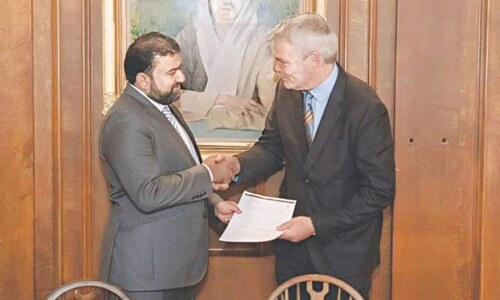ISLAMABAD: Bad news continues to pour in for electricity consumers almost daily as K-Electric and ex-Wapda distribution companies (Discos) on Thursday sought to generate more than Rs155 billion through unprecedented Rs11.4 and Rs9.90 per unit additional fuel cost adjustment (FCA), respectively, for electricity consumed in June.
A day earlier, National Electric Power Regulatory Authority (Nepra) had concluded a hearing on a government directive for about Rs7.91 per unit increase in average base tariff across the country in three phases, starting from the current month. The government has also approved a Rs1.55 per unit increase in base tariff across the country under a quarterly adjustment.
Nepra on Thursday said it had accepted for hearing separate tariff petitions from the Central Power Purchasing Agency (CPPA), on behalf of all ex-Wapda Discos, for a record Rs9.90 per unit monthly FCA for electricity sold to consumers in June. This will generate about Rs133bn in additional funds in August. The additional FCA is almost 166pc higher than the reference fuel cost charged to consumers in June, which is an unprecedented mismatch between estimated and actual fuel cost.
Separately, KE’s request for Rs11.4 per unit additional FCA for June was accepted for a public hearing to generate Rs22.25bn. Both the hearings have been called on July 28 for verifying evidence and fuel invoices. KE said the major reason behind its higher FCA was 50pc expensive LNG and 74pc increase in power purchase from CPPA.
Regulator fixes public hearing on 28th
Data showed that despite 51pc power generation from cheaper domestic resources with static prices, Discos have sought permission to raise about Rs133bn additional funds in August.
The CPPA claimed that the consumers were charged a reference fuel cost of Rs5.93 per unit in June, but the actual cost turned out to be Rs15.84 per unit, hence an additional charge of about Rs9.9 per unit to consumers, up 166pc.
The higher electricity rates, once approved, would be charged to all consumers in the next billing month except to those using less than 50 units.
Data shows that the share of domestic fuel sources in overall power generation was slightly lower at 51.58pc in June compared to a robust 54pc in May and better than 50pc in April and 45pc in March. The share of hydropower supply in the overall basket stood almost unchanged at more than 24pc as in May. Hydropower has no fuel cost.
The share of nuclear power almost dropped by 50pc to 9pc in June from 13pc in May and 17.37pc in April because of the closure of 1,100MW K-2 for re-fuelling.
As a result, the biggest contribution of over 24.43pc in overall power supply came from imported RLNG-based power plants, partly at very expensive rates, and its share was nominally higher than 23pc in May. The share of domestic gas in power generation stood increased to almost 11pc in June against 10pc in May and April.
Published in Dawn, July 22nd, 2022









































Dear visitor, the comments section is undergoing an overhaul and will return soon.